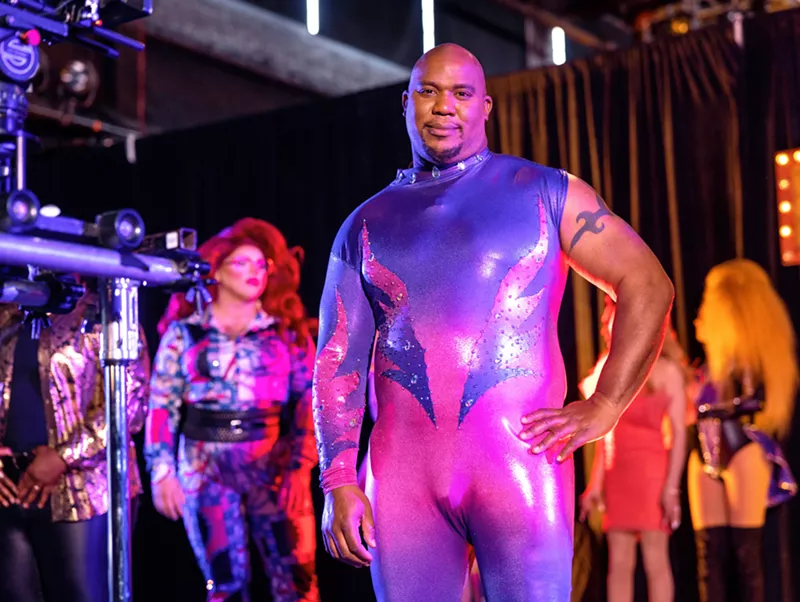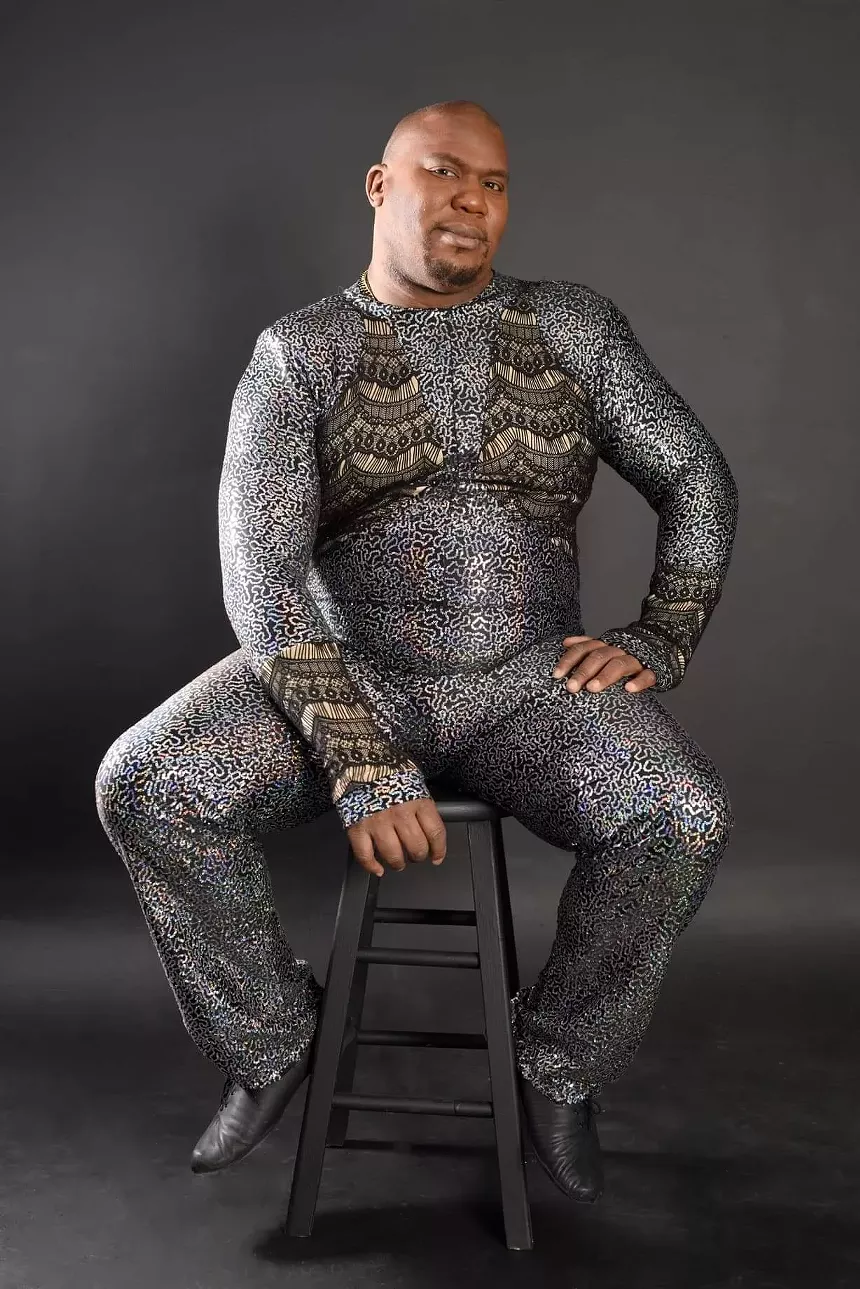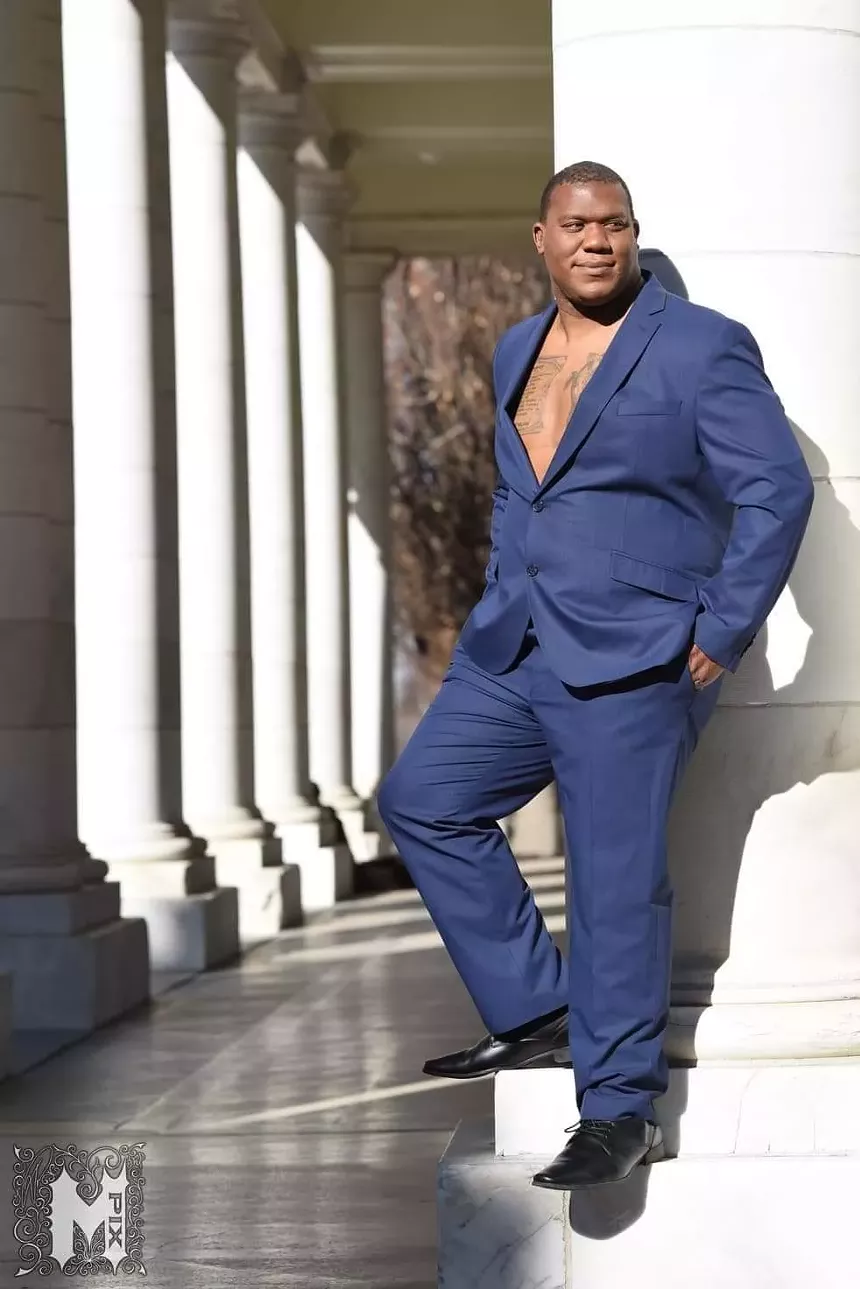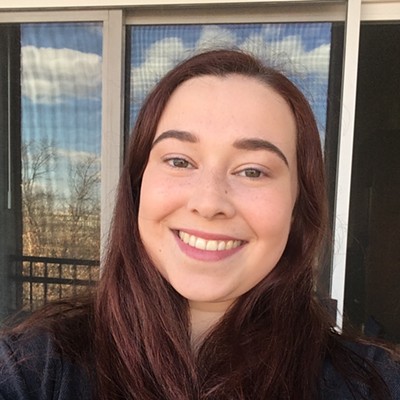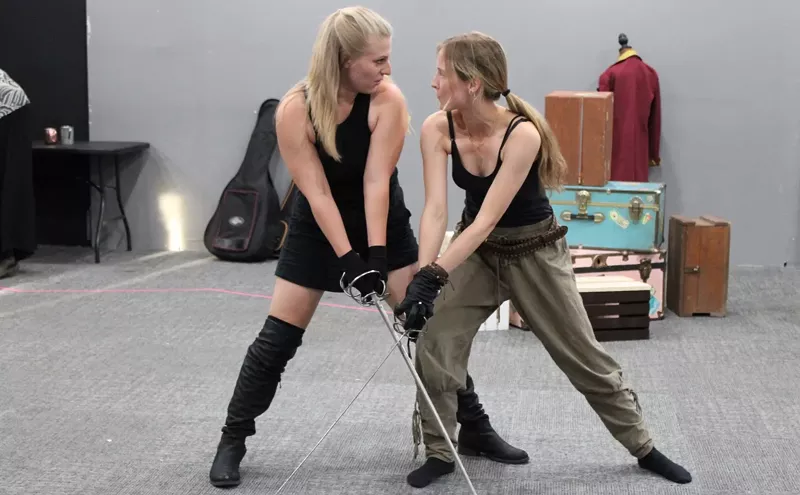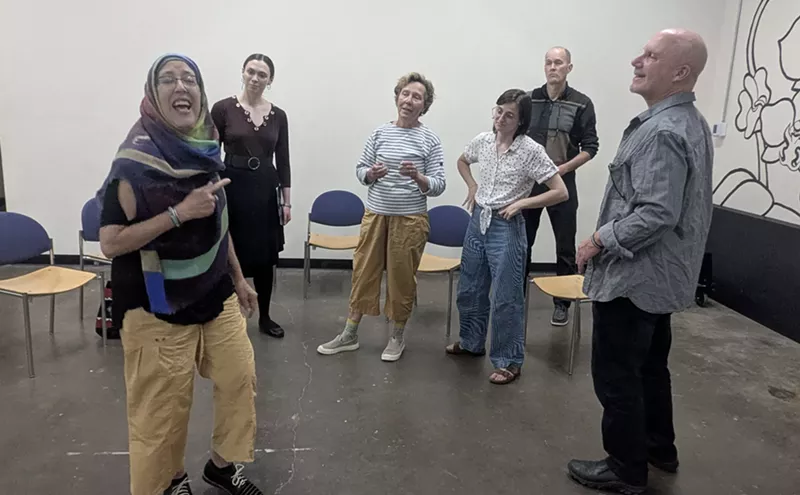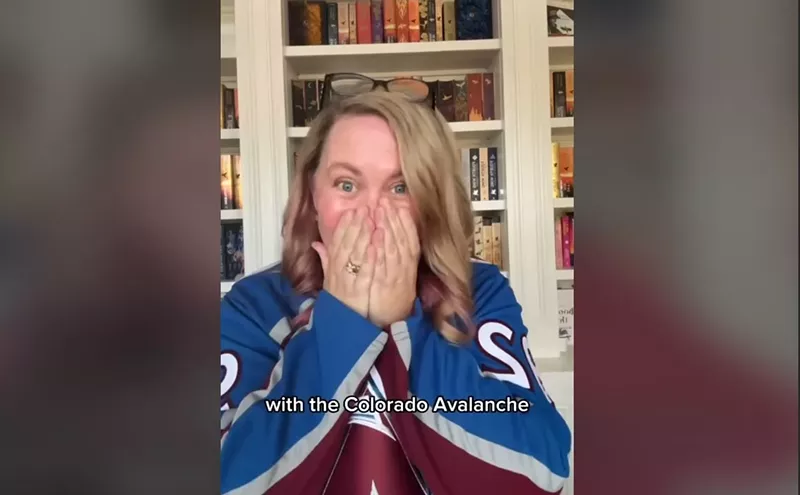This Veterans Day, drag performer and Army veteran Zeus Devereaux (whose real name he prefers to keep private) was supposed to be gearing up to compete in the Mr. Gay United States pageant in Roanoke, Virginia. Instead, he'll be home in Colorado Springs, nursing a shoulder injury and cheering on his pageant family from afar. Finding out he had to take a break from performing right before the pageant was a huge disappointment, but the 38-year-old is not letting the setback deter his goal. With his sights now set on next year's pageant, Devereaux opens up about the cutthroat reality of the pageantry system, Colorado drag and being a voice for LGBTQ veterans.
Devereaux was born into a military family and grew up as an Army brat moving from base to base, but he considers Jacksonville, North Carolina, his hometown. It was in North Carolina that Devereaux was introduced to the art of drag. "My first drag show I went to, I was nineteen, and it was in Wilmington, North Carolina, at a bar called Ibiza Wilmington. That's where I saw my first drag queens, Scarlett Dailey and Tara Nicole Brooks. They're pretty much the idols in Wilmington in the gay community," Devereaux recalls. "Then I moved to Texas, to San Antonio, and I went to the drag scene out there, and it was more open, more creative."
While in San Antonio, he brushed shoulders with drag legends like Dakota Whitney, Desi M. Andrews and the late Erica Andrews, who were also heavily involved in the pageant world. Although Devereaux moved to Colorado soon after, he still counts those in San Antonio among his drag family, and often leans on them for help with his pageantry.
When Devereaux moved to Colorado Springs in 2009, he enlisted in the Army and was deployed to Afghanistan within months of arriving at Fort Collins for basic training. But before he left, he caught a glimpse of Colorado drag, which was entirely different from what he was used to in the South. "I came up here and my first show I went to was at Tracks, back when they were doing Drama Drag, and I was like, 'What is this?'" Devereaux says of his first experience at DJ Nina Flowers's trailblazing drag showcase. "It was completely different from what I was used to. I'm used to feathers and big hair and that kind of thing. I came here and it was not what I expected, but the more I came up here, then I got it."
The "Don't Ask, Don't Tell" policy was still in full effect during Devereaux's 2009-2010 deployment, meaning he had to keep his sexuality under wraps. Still, he says, it was more of an open secret. "It was different. People knew, but they didn't say anything," he says. "As long as you did your job and didn't do nothing crazy, you were good. Growing up down South, being Black and being gay, it's hard enough." By the time he left the service, Don't Ask, Don't Tell had been repealed (in 2011), but Devereaux still sees the way the military treats queer people, especially queer people of color, as an ongoing issue.
After a nine-month tour in Afghanistan, Devereaux returned to Colorado Springs, where he remained active military until April 2012 and was in the reserves until 2019. Once he retired from active duty, Devereaux explored different facets of Colorado's gay nightlife scene, a far cry from the buttoned-up military world where he was not allowed to fully express his sexual identity. "After I got out, I started doing drag. I learned from Porsha Demarco Douglas; her and Kyree Myst gave me my start. I took the criticisms they gave me and ran with it," he says. Although Devereaux now splits his time between Colorado Springs and Denver (where his boyfriend lives), his roots as a performer are firmly in the Springs. "I started in Colorado Springs, and my first show was at Bubbles, which is no longer there," he says. "My drag mom, Ramiyah Devereaux, still lives in Colorado Springs. She took me under her wing."
Devereaux competed in his first pageant in Colorado Springs in 2015 and was immediately hooked. "Drag is what got me into pageants. I'm very competitive; I will go for blood sometimes. I did my first pageant in the Springs — that was a learning experience. That's where I got the pageant bug. I did not know what I was doing," he says with a laugh. "Doing a pageant, it's pretty much Miss America on steroids. To get a package together, it takes six months to a year." Not to mention a hefty budget, lots of helping hands, a meticulous eye for detail and, of course, a lot of nerve.
The Gay United States Pageantry System was founded in Roanoke, Virginia, in 2004 by Tim Clark and Dale Thompson, who wanted to create an alternative pageantry system to what is known as the "Big Three": Continental Pageantry, United States of America and Miss Gay America. The Mr. Gay United States division is open to all male entertainers over 21 years old, and the winner serves as an administrator, spokesperson and promoter for the pageant. Preliminary rounds are held in over 25 states months in advance of the finals in Roanoke. Colorado is not one of those states, but contestants are allowed to compete in any state's preliminary competition, regardless of whether or not they are a resident.
This year, a friend (who happened to be a past Mr. Gay United States title holder) urged Devereaux to compete for Mr. Gay Nebraska in March: "I took a break from pageants, and then a friend of mine, Gunner Calvin Scout, recruited me for the prelim for the Mr. Gay Nebraska pageant. A lot of people go to different states to compete," Devereaux says. He placed as the first alternate to Mr. Gay Nebraska 2021, meaning he would still get to attend the national rounds in Virginia. "First alternate is you don't win, but if the person who wins can't do it, you step up and do everything, like an understudy," he explains. "You still go to nationals, you still have to raise money."
Since March, most of Devereaux's time has been devoted to preparing for nationals. The pageant consists of four sections: Personal Interview, Americana Fashion Runway, Creative Formal Wear and Talent. "You have to come up with creative costumes, you have to do interviews. There's four categories you have to do, and it's a pain in the butt; it is," he says. "You get a list after the prelim, and it's pretty much the same categories. Interview dress is suit and tie to the nines; you have to dress like you're going to church. ... They could ask you anything, they could ask you why the sky is blue.
"Americana Fashion Runway, that's pretty much America's Next Top Model meets the Red Ball," he continues. "They're so particular about how stuff looks on you. It's the small details they look at, too. It's presentation, how well you model, fit, that kind of thing. I like to be clean-shaven from being in the military for five years. I was so used to not having facial hair that now I'll leave the goatee but I shave everything else."
All looks for the Americana Fashion Runway must be exclusively red, white and blue (and yes, they must contain all three colors). So Devereaux took a plain white suit, made by his go-to costumer designer, Aaron Graves, and brought it to his friend and "stoning god" Joe Salas to adorn with red and blue rhinestones. Salas also embellished Devereaux's Creative Formal Wear look, which is meant to be a contestant's creative spin on a suit. Devereaux's suit was punk-inspired, decorated with pins, mirrors, feathers and completed with a bedazzled skull mask. "There's a point system for every category. If you're not on your A-game, forget it," Devereaux warns. "They'll tell you!" Points can be deducted for seemingly minor components such as the length of a contestant's pants, but Devereaux is used to the scrutiny; the military was just as exacting.
Devereaux's talent section combines his drag and ballroom skills (he is part of the legendary House of Ninja, an iconic name in ballroom culture) to deliver a lip-sync performance filled with voguing and acrobatics. "I'm a person of all trades," he says. "Drag, leather, ballroom scene, advocacy, pageants. There's a lot to me [that] people just don't know." Despite his six years of experience in the pageant world, Devereaux still gets nervous when it's time to compete. "When I went to the prelims, I was a nervous wreck. I've done this before, but I still get nervous. I get in my head a lot, like, 'Don't screw up! Step this way, step that way, do this, don't do this.'
"It's the military in me," he acknowledges.
Because of his high-energy performance style, months of performing and practicing for the pageant exacerbated an old shoulder injury Devereaux sustained during his military service. Unfortunately, in early October his doctor informed him that continuing to perform would be a severe health risk, so Devereaux is postponing his run for Mr. Gay United States until 2022. "I'm not going this year, because my orthopedic surgeon said I can't do anything crazy because of my shoulder. I have to do physical therapy and all that. It's from the military; about four years ago, they had to go in and shave the bone down. Being in the military for five years, that took a toll. It started acting up again, and my surgeon said if I kept doing what I was doing, I would need surgery again. When I perform, I do a lot of acrobatics and voguing, so I have to take it easy," Devereaux explains.
Thankfully, his pageant family fully supported his decision to take a break and strengthen his shoulder. "I already let the promoter and everyone know, and they understand that your health comes first. I'm just going to rest up and do the pageant next year," Devereaux says. "If you get a doctor saying you can't do anything, you have to listen to the doctor. But my Gay United States family told me to take care of myself and heal up quick."
Winning Mr. Gay United States next year would be a huge achievement for Devereaux on multiple levels. Besides being a personal triumph, it would give him a chance to expand the pageant scene in Colorado. "In Denver, there's not much male pageantry going on. I don't know why. There's so many good male entertainers here. I'm trying to put pageants on the map here in Colorado. They're trying to make Colorado a pageant state, but where would you have it? You need a promoter, everything. Colorado is a work in progress for pageants," says Devereaux, who hopes that a national win could help accelerate that progress. A big part of expanding the presence of pageants in Colorado is introducing new generations of LGBTQ performers to the Gay United States Pageantry System, and Devereaux aims to continue to do so.
"A lot of people ask me, 'How do I get into pageants? How do I get into drag?'" he says. "So I mentor them, too."
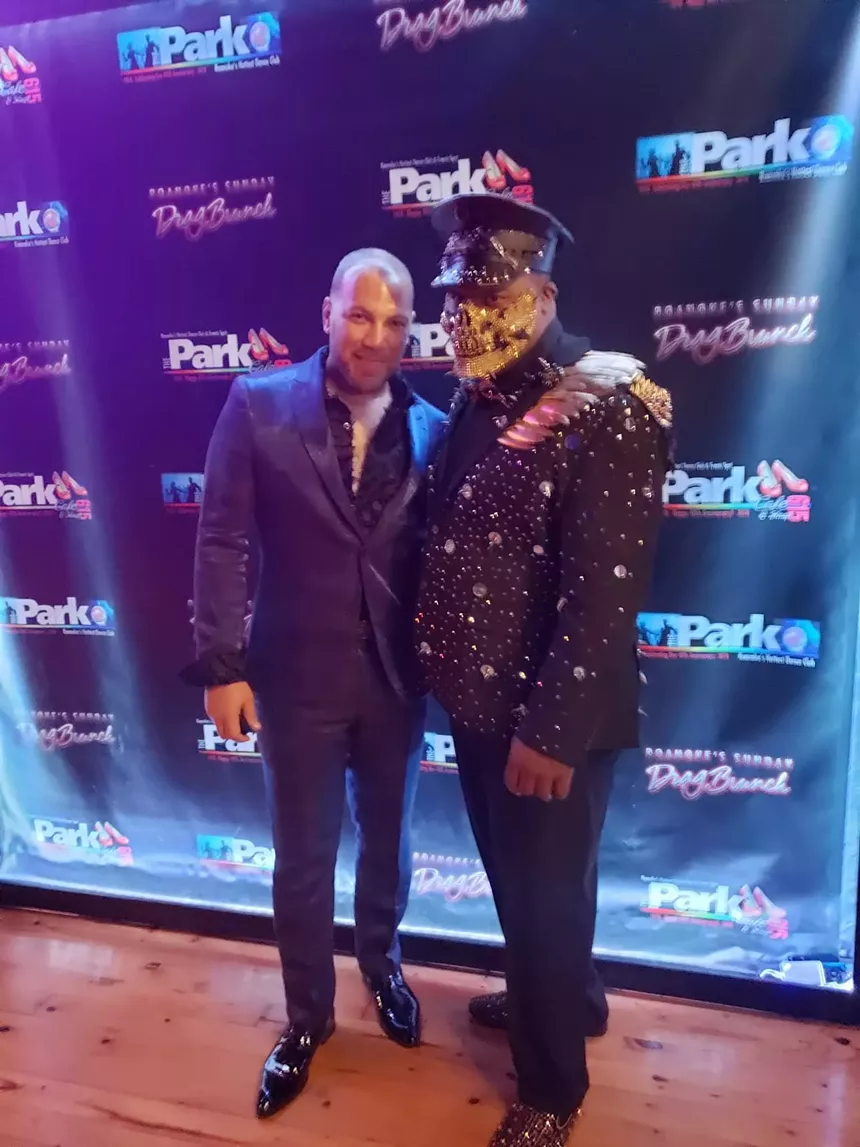
Devereaux's Creative Formal Wear outfit was made by Aaron Graves and Joe Salas.
Courtesy of Zeus Devereaux
For now, Devereaux will focus on physical therapy, mentoring young performers and supporting his drag family and friends at their shows — from the audience. His final parting advice for those looking to get into pageants: "Four-way stretch is a godsend."

